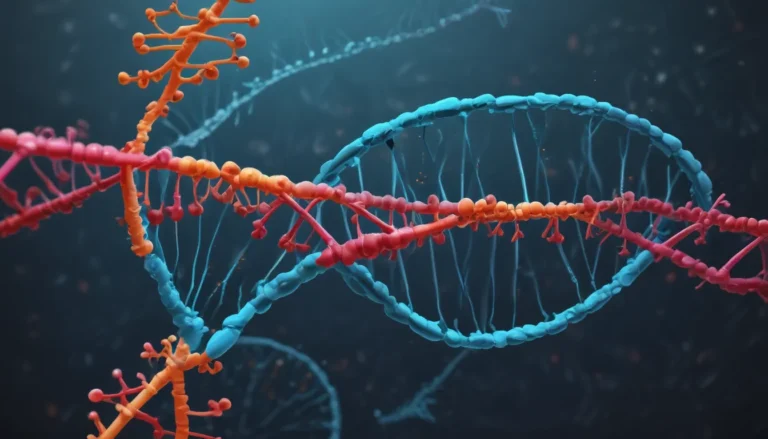A Note About Images: The images used in our articles are for illustration purposes only and may not exactly match the content. They are meant to engage readers, but the text should be relied upon for accurate information.
Are you ready to embark on a journey through the captivating world of pyruvate? As a key molecule in cellular metabolism, pyruvate holds the key to understanding the intricate processes that drive energy production and biochemical reactions within living organisms. In this article, we will uncover 15 astonishing facts about pyruvate that will shed light on its significance and versatility, offering a deeper insight into its role in the fascinating realm of biology.
The Multitasking Superhero: Pyruvate’s Remarkable Functions
- Pyruvate is a multitasking superhero in our body, assisting with energy production, protein building, and combating cell damage.
- Found in foods like cheese and yogurt, pyruvate plays a crucial role in maintaining our overall health.
- While pyruvate offers benefits like enhancing exercise performance, caution is advised when considering supplements due to ongoing research on potential side effects.
The Essential Role of Pyruvate in Cellular Metabolism
Pyruvate serves as a key player in cellular metabolism by acting as an intermediate product in glycolysis and the citric acid cycle. These processes are vital for energy production within cells, highlighting the crucial role of pyruvate in sustaining cellular functions and overall metabolism.
Pyruvate: The Product of Glucose Breakdown
Through the process of glycolysis, glucose is broken down to form pyruvate in the cytoplasm. This fundamental mechanism provides a source of pyruvate for further metabolic reactions, ensuring a continuous supply of energy for cellular processes.
The Conversion of Pyruvate into Acetyl-CoA
Under specific conditions, pyruvate can be converted into acetyl-CoA within the mitochondria. This conversion allows for the entry of pyruvate into the citric acid cycle, where ATP, the primary energy currency of the cell, is generated to support various cellular functions.
Pyruvate: A Precursor for Amino Acid Synthesis
Pyruvate serves as an important precursor for amino acid synthesis, contributing to the building blocks of proteins within the body. Through enzymatic reactions, pyruvate is transformed into specific amino acids, playing a vital role in protein synthesis and cellular function.
Pyruvate’s Involvement in Lactate Production
In scenarios of intense exercise or insufficient oxygen, pyruvate can be converted into lactate through lactic acid fermentation. This process allows for the regeneration of NAD+ and the continuation of glycolysis, showcasing pyruvate’s adaptive functions in energy metabolism.
Exploring Pyruvate’s Antioxidant Properties
Research indicates that pyruvate exhibits antioxidant effects, helping to mitigate oxidative stress and protect against cellular damage. These properties position pyruvate as a valuable compound in anti-aging strategies and disease prevention protocols.
Enhancing Exercise Performance with Pyruvate Supplementation
Studies suggest that pyruvate supplementation may improve exercise performance by enhancing endurance and reducing fatigue. This supplementation is believed to optimize ATP production and metabolic pathways involved in energy metabolism, offering potential benefits for athletes and active individuals.
Pyruvate: A Key Player in Glucose Synthesis
Through gluconeogenesis, pyruvate can be converted back into glucose, crucial for stabilizing blood sugar levels during periods of fasting or low carbohydrate intake. This regulatory mechanism underscores pyruvate’s role in maintaining metabolic balance within the body.
Unveiling Pyruvate’s Potential in Cancer Research
Researchers have explored the anti-cancer properties of pyruvate, highlighting its potential to inhibit cancer cell growth and induce cell death. This promising area of research underscores pyruvate’s significance in cancer therapy and the potential development of targeted interventions.
Exploring the Presence of Pyruvate in Food Sources
Pyruvate is naturally present in various foods, including cheese, yogurt, red wine, and dark chocolate. Incorporating these foods into your diet can contribute to supporting metabolic processes and overall health by enhancing pyruvate levels in the body.
Pyruvate and Metabolic Disorders: A Connection Worth Investigating
Disruptions in pyruvate metabolism have been linked to metabolic disorders such as diabetes and obesity. Understanding the role of pyruvate in these conditions can pave the way for targeted therapies and interventions aimed at addressing metabolic imbalances and promoting health.
The Adaptive Capacity of Pyruvate: Converting into Essential Molecules
Pyruvate can serve as a precursor for various crucial molecules, including alanine and oxaloacetate, playing essential roles in protein synthesis and the citric acid cycle, respectively. This versatility underscores the significance of pyruvate in facilitating diverse cellular processes.
Pyruvate’s Impact on Gene Regulation: A Closer Look
Studies have demonstrated that pyruvate can modulate gene expression, potentially influencing cellular processes and functions. These findings open new avenues of research into the regulatory role of pyruvate in gene expression and its implications for overall health and well-being.
Influencing Pyruvate Levels through Dietary Choices
Dietary factors can influence pyruvate levels in the body, with low-carbohydrate diets increasing pyruvate production from fat metabolism and high-carbohydrate diets enhancing pyruvate generation from glucose consumption. Understanding these dietary influences underscores the importance of balanced nutrition in maintaining metabolic health.
Proceed with Caution: Considerations for Pyruvate Supplementation
While pyruvate supplementation shows promise in various areas, it is essential to approach it cautiously. Further research is needed to determine the optimal dosage, potential side effects, and long-term implications of pyruvate supplementation to ensure safe and effective use.
Conclusion: Unveiling the Marvels of Pyruvate
In conclusion, the 15 astonishing facts about pyruvate offer a glimpse into the fascinating world of cellular metabolism and energy production. From its pivotal role in glucose metabolism to its potential applications in exercise performance and disease prevention, pyruvate continues to intrigue researchers and enthusiasts alike. By delving deeper into the multifaceted functions of pyruvate, we uncover its significance in maintaining metabolic balance and supporting overall health.
FAQs: Unlocking the Mysteries of Pyruvate
-
Q: What is pyruvate?
A: Pyruvate is a key molecule in cellular metabolism, acting as an end product of glycolysis and contributing to energy production within cells. -
Q: How is pyruvate produced?
A: Pyruvate is produced during glycolysis in the cytoplasm, where glucose is converted into pyruvate through a series of enzymatic reactions. -
Q: What role does pyruvate play in energy production?
A: Pyruvate is converted into acetyl-CoA, which enters the citric acid cycle to generate ATP, the primary energy currency of the cell. -
Q: Can pyruvate be used as a nutritional supplement?
A: Pyruvate supplements are marketed for enhancing athletic performance and weight loss, although further research is needed to ascertain their efficacy and safety. -
Q: How do different organisms utilize pyruvate?
A: Pyruvate can be converted into lactic acid in bacteria during fermentation and into ethanol in yeast, showcasing its diverse metabolic functions across various organisms. -
Q: Is there a link between pyruvate and diseases?
A: Pyruvate metabolism is implicated in conditions such as cancer and metabolic disorders, driving ongoing research into potential therapeutic applications and interventions.
Embark on a journey of discovery as you unravel the complexities of cellular metabolism and delve into the mysteries of pyruvate’s pivotal role in sustaining life and promoting health. By exploring the multifaceted functions of pyruvate, you gain a deeper appreciation for the intricate network of biochemical pathways that drive cellular processes and support overall well-being.
In our commitment to delivering valuable and reliable content, each fact presented on our platform undergoes meticulous review by our dedicated editors. Your trust in our dedication to accuracy and authenticity fuels our mission to provide engaging and insightful information on a wide range of topics. Join us on a journey of exploration and learning as we uncover new insights and expand our knowledge together.






